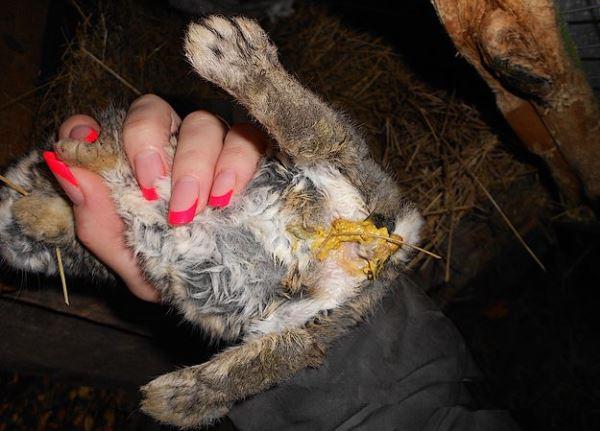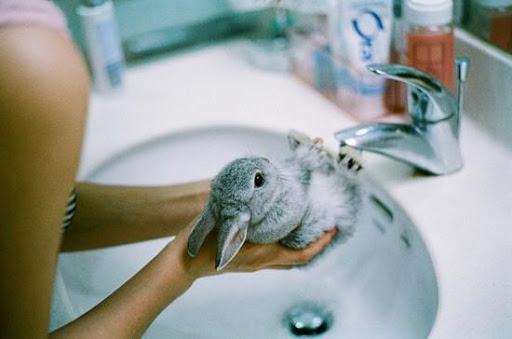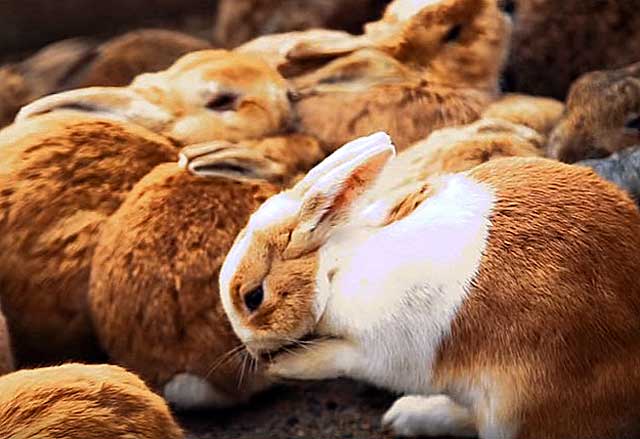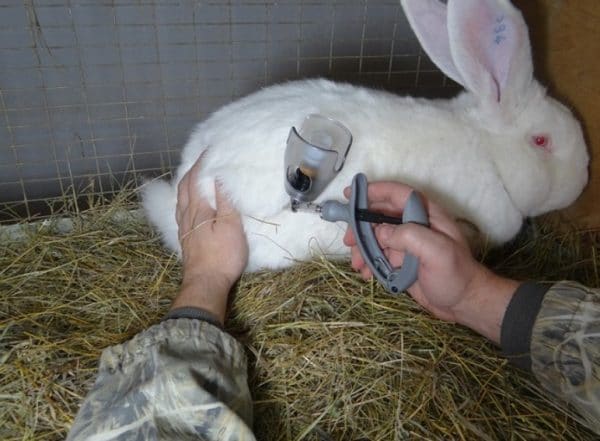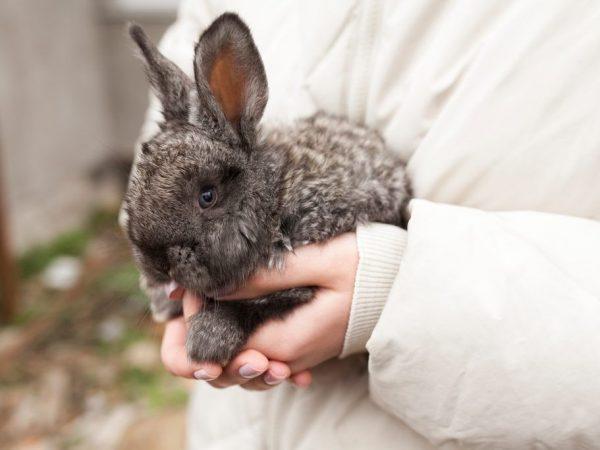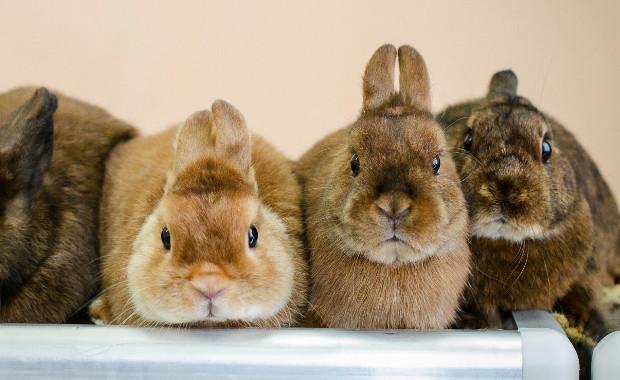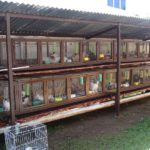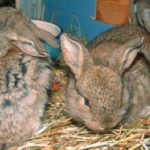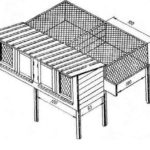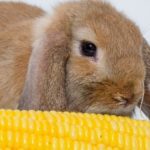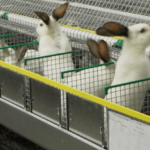The appearance of diarrhea in a rabbit is due to the influence of a variety of factors. These include infectious pathologies, helminthic infestations, and food poisoning. Problems are also caused by changes in diet, stress factors, and violations of living conditions. To eliminate violations, it is necessary to establish the causes of their occurrence. To prevent diarrhea, vaccination must be carried out in a timely manner.
Causes of liquid stool
Currently, food poisoning is considered the main and most common cause of diarrhea. It may be associated with feeding animals with low-quality products. Also, a common mistake made by breeders is the use of wet greens. But other violations also occur.
Infectious diseases
Many bacteria that cause diarrhea in animals normally live in the intestines. They take part in feed processing. However, when immunity decreases, microorganisms become pathogenic. The following factors lead to this:
- change of feed;
- use of low-quality products;
- violations in the conditions of detention - low temperature or high humidity;
- stress factors - especially important for decorative rabbits;
- secondary infections that appear as a result of invasion.
The appearance of diarrhea may be associated with insufficient chewing of food in the presence of infectious stomatitis. This is a serious viral pathology that occurs at any time of the year and quickly affects the entire population. Stomatitis is accompanied by redness of the oral mucosa with a white coating. Gradually they become brown. Ulcerative defects lead to loss of appetite.
Rabbits and pregnant females can suffer from salmonellosis. Infection can occur through food. It is also spread by birds and rodents. As the pathology develops, animals experience exhaustion and diarrhea.
Helminths and protozoa
Many parasites live in rabbits in the intestines. The maximum harm is caused by worms that affect the liver, bile ducts, and pancreas. They also often affect the mucous membranes of the digestive organs. This provokes digestive disorders and prevents the absorption of food and water molecules.
Single-celled organisms can provoke coccidiosis. Diarrhea is observed with this disease. Animals also suffer from flatulence, exhaustion, loss of appetite, and dirty fur. Mass deaths of animals are often observed.
Another helminthic infection to which domestic rodents are susceptible is passalurosis. In this case, animals experience severe itching in the anal area. Rabbits become infected when they eat contaminated food. If sanitary standards are not observed, there is a risk of injury to the entire livestock.
The larvae of the cestode Cysticercus pisiformus provoke the appearance of cysticercosis. In this case, the internal organs become covered with blisters. In addition to diarrhea, rabbits suffer from decreased appetite and quickly become exhausted. Pathology leads to mass mortality - especially among rabbits.
Non-communicable pathologies
Problems may be caused by dietary irregularities, sudden changes in diet, or the use of spoiled foods. All these factors provoke inflammation of the mucous membranes of the intestines and stomach. Pets should not be given frozen root vegetables that are covered with dirt or mold. It is recommended to slightly wither fresh grass first.
It is important to change the diet of animals gradually. The rabbit needs to adapt to new food. In this case, the daily volume should be increased gradually. Often the provoking factor is the so-called burnt grass, which was piled in a dense heap. Such food provokes an upset stomach, which is accompanied by diarrhea.
First aid
If diarrhea occurs, the rabbit must be immediately isolated from the herd. This will prevent the spread of infectious disease.During this period, you should definitely clean the fur from fecal residues and give the rabbit clean water or chamomile infusion.
A sick rabbit must have access to water. This will help prevent dehydration, which can often lead to death.
Then you should try to independently identify the provoking factors of loose stool. If there is mucus, blood, or changes in color in the feces, and the rabbit does not eat, you should immediately contact a veterinarian. These symptoms indicate an infection. It can be viral or bacterial.
How and how to treat diarrhea in a rabbit
Therapy should be started only after consultation with a doctor. As a rule, medications and traditional recipes are used for diarrhea.
Pharmacy drugs
The following remedies can be given to treat animals at home:
- "Linex". The drug helps improve intestinal microflora and cope with flatulence. It is recommended to give adult animals half a capsule of the medicine twice a day.
- Activated carbon. The composition helps with flatulence and food poisoning. The tablet must first be crushed and added to the feed.
- "Bycox." The product is used for infections. To do this, mix 1 liter of water with 1 small spoon of the product and give the rabbit the resulting solution to drink throughout the day.
Traditional methods of treatment
You can make effective folk compositions at home:
- Chamomile. Take 1 large spoon of herb, mix with a glass of boiling water and leave for a quarter of an hour. Strain and give the resulting solution three times a day, 1 large spoon.
- Bloodroot. Take 1 large spoon of dried herb and mix with a glass of boiling water. Leave for 20 minutes. Give the rabbit 1 small spoon three times a day.
- Oak bark.It is recommended to add a decoction of this product to clean drinking water. This will help avoid dehydration.
Special diet for sick rabbits
If diarrhea occurs, it is recommended to make adjustments to your diet. It is important to provide your pet with hay and control its access to water. It is also permissible to introduce deworming agents into the drinking bowl.
It is recommended to remove succulent food, protein foods, flour, and fatty foods from the diet. The diet should contain a lot of oats and mixed feed, which includes useful elements. In this case, you should avoid chemical additives. Doctors advise giving rabbits astringent herbs. These include wormwood and burdock. It is also acceptable to use yarrow.
If you refuse to drink, there is a risk of animals dying from dehydration. In this case, the rabbits have to be force-fed using a disposable syringe. It is also permissible to administer saline solution by injection. Such injections are performed 2-4 times a day.
Measures to prevent diarrhea
To prevent diarrhea, animals should be vaccinated in a timely manner. Vaccinations should be given to young animals at the time of weaning. The first time the procedure is performed 30-40 days after birth. Many vaccines for common infections must be given at intervals of 9-12 months.
To avoid poisoning and infection of animals, you should adhere to the following rules:
- Balance your diet. Food should contain a lot of carbohydrates, a minimum amount of fat and protein.
- When purchasing, consider the composition of the feed and the quality of the grains.
- Do not give your rabbit a lot of vegetables and fruits.
- Greens must be washed and dried before feeding to animals. It is best to use dried grass.
The active spread of pathogenic bacteria is caused by overcrowded cells and room pollution. Therefore, it is recommended to change the litter at intervals of 2-3 days. Of no small importance is antimicrobial sanitization, which must be performed once every 2 weeks.
Rabbits are more susceptible to intestinal problems. To improve the bacterial microflora of the stomach, it is recommended to give Biomycin to the cubs. Also, diarrhea can be prevented by using plants high in fiber.
The appearance of diarrhea in rabbits can be caused by a variety of factors. The causes of problems include infections, violations of living conditions, and helminth infections. To cope with diseases, it is recommended to contact a veterinarian in a timely manner and strictly follow his recommendations.

